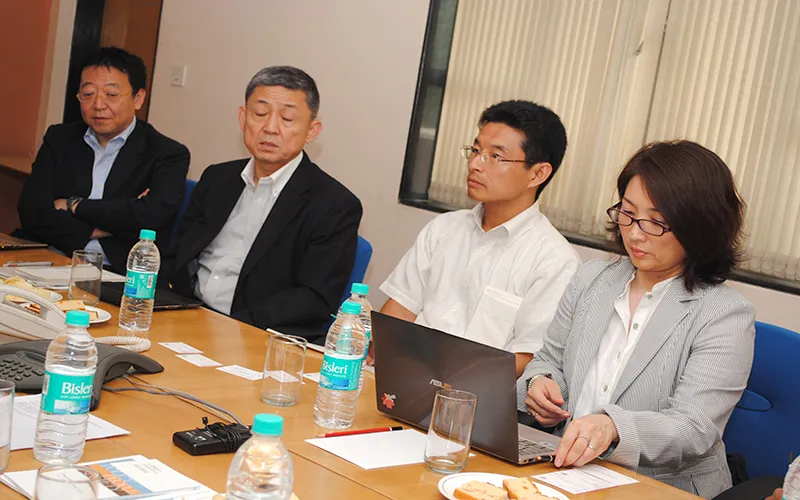-
CENTRES
Progammes & Centres
Location
Prominent Japanese scholars feel that the United States' position is changing vis-à-vis China. They also think that Tokyo was wary of the possibility where the US and China might cut a deal.

Prominent Japanese scholars feel that the United States’ position is changing vis-à-vis China. They also think that Tokyo was wary of the possibility where the US and China might cut a deal.
These views were expressed during a roundtable at Observer Research Foundation on June 28, 2012 by a delegation of six Japanese scholars led by Prof. Noboru Yamaguchi of the National Defence Academy of Japan.
Prof. Yamaguchi also noted that the Americans are concerned about China’s possible strategy of expanding from the "first chain of islands" (Okinawa to South China Sea) to the "second chain of islands" (Tokyo to Guam) and then to Indian Ocean. He said Washington cannot afford to lose its primacy over these water bodies and let Chinese operate, which will be a costly affair for the Americans
During the roundtable held in the backdrop of China’s rise and its growing assertiveness increasing uncertainty in East and Southeast Asia, there was a general consensus among the participants of the need for deepening partnership between Japan and India in the context of the rapidly changing geopolitics in the Asia-Pacific region.
The roundtable discussed various aspects ranging from the US "pivot" to Asia, security and cooperation of the region to India-Japan partnership.
Prof. Yamaguchi said that to answer to the emerging dangers, Japan needs to build robust capabilities to protect their islands. According to him, the military strategies of Washington and Tokyo are getting closer through conducting various military exercises.
China will be a constant factor in the South Western Islands, Prof. Yamaguchi said. He noted that it would be impossible to contain China. He pointed out that it was critical to both engage and hedge China.
Prof. Yamaguchi asserted that Japan is wary of the possibility where the US and China enter into agreements which would leave Japan to follow the rules made by great powers. He asserted that the US "return" to Asia was a consequent of its willingness to withdraw its troops from Afghanistan and Iraq. However, but if the security situation in this region worsen which will mean that the US will have to continue its focus in West Asia, this will put East Asia’s security in jeopardy.
There was a general consensus among the participants that Asia was going through a hard time domestically and India and Japan were no exception. Mr. Tsuneo Watanabe of the Tokyo Foundation pointed that the government in Japan is bound to change into a coalition government, which he said was a bad news.
Mr. Nandan Unnikrishnan of the ORF said the lack of leadership and slow economy was a problem in India.
The discussion again brought out the growing notion that Japan was diversifying its security cooperation and India was seen as a potential strategic partner. It was noted that one of the goals of India-Japan partnership was to provide multiple players to maintain peace and stability in the region without allowing single nation dominate the region.
It was also pointed out that there was complication, in that, the US has a lot of influence in the region and therefore the US rebalancing of position vis-à-vis China may divide Asia.
The contradiction between China’s expansion of military power and US forward military presence in Asia was going to play an important role, it was pointed out. The solution could be either compromise or conflict. The Japanese delegation pointed out that the position taken by Tokyo after the Democratic Party of Japan (DPJ) came to power has been focused on the Senkaku Islands and to collaborate with other powers to build defence capabilities. They added that the US cannot miss the action since Asia was the global epicentre for both trade and power. It was also pointed out that the US was compelled to reconsider its position towards three major sea-powers - India, Korea and Japan.
It was pointed out that China will continue to expand its influence as it grows and incidents in the deep-sea for maritime control will continue to happen. The meeting also noted that regional countries have been cautious of giving China any wrong signals as every country is benefiting from it economically despite that security concerns as China’s military expand rapidly.
Prof. Yamaguchi asserted that old concept such as "deterrence" is not the right approach in the evolving security environment because China is not necessarily an enemy, but the future remained uncertain.
Prof. C Raja Mohan of the ORF, who chaired the roundtable, provided the way forward in this changing security scenario of Asia. He noted that it was critical to engage China and likeminded nations need to pressurise China to act responsibly as a great power. At the same time, Asia needs to be prepared for the worst case scenario where the great powers may cooperate and construct rules for the rest of the world.
(This report is prepared by Swati Arun, a Research Intern, at Observer Research Foundation)
The views expressed above belong to the author(s). ORF research and analyses now available on Telegram! Click here to access our curated content — blogs, longforms and interviews.